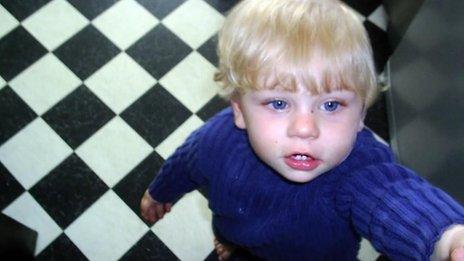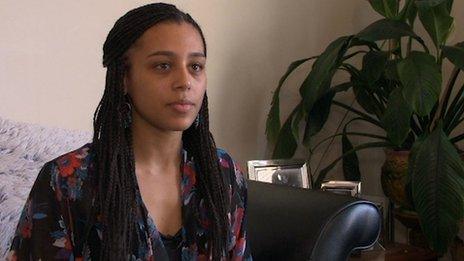Children in care soar as councils seek more foster parents
- Published

After the Baby Peter cruelty case, more children have been taken into care across England
In all the news coverage of councils struggling with budget cuts, it's easy to overlook some big increases in funding.
Resources are being shifted into two key care services: adult care and child protection.
The reasons? Our population is getting older and new child care legislation.
It was the repercussions of the Baby Peter child cruelty case, external in Haringey, north London, that forced a national overhaul in council policy towards child protection and, as a result, more children are now in local authority care.
In Leicestershire there's been a 25% increase of children in care in recent years. Its county council needs money for 40 extra carers annually.
Derbyshire had up to 700 children in care by 2012 and now needs 50 extra foster parents each year.
Nottinghamshire has particular demands: it currently has 850 in care, double the number it had before the Baby Peter reforms.
That, in turn, is putting added pressures on council care budgets.
'Loving homes'
So here's why councils such as Nottinghamshire need more foster parents: to keep a child in council residential care costs the authority £2,100 per week.
Compare that to £447 - that's the cost to the council per week of a child in a foster home. Each year, it needs to recruit 25 more carers.
Behind the talk over budgets, there are the children who need loving homes.
I met 19-year-old Naomi Maher, who's been living with her current fosters parents in Nottinghamshire for 12 years.
"When I was first in care, I went into four or five placements in a quite short period of time. It was quite daunting and confusing," she told me.

Noami Maher has lived with her Nottinghamshire foster family for 12 years
"When I came to this family, it was much better for my personal well-being. It's important to have stability to guide you, especially when you are growing into adulthood."
Her foster parents are Eleanor and John Morrison.
"After I got married, I had three children and I always wanted a big family," Eleanor told me.
"So we decided, as a family, we should offer something else to other children and put ourselves forward to be foster carers."
Assured and confident, Noami's next step is university, thanks to foster parents who gave her a warm, loving home when she needed it most.
"Is does surprise me that more people don't adopt or foster, but I think they should," she added.
But not every child in care finds a ready-made foster home.
A number of councils are attempting to encourage more people to consider becoming fosters parents.
"We now have 400 more children in care than there were four or five years ago. And that's expensive for an authority," said Councillor Kate Foale, Nottinghamshire County Council's lead member for child care.
"The best for those children is in a loving foster or adopting home. Not only is it cheaper for us, it's much better for them."
'Tiny' miracles
Child counsellor Lisa Creasey and her school teacher husband John are among some of the new foster carers.
Lisa explained to me what's involved after an initial meeting with social services: "You talk through the reasons why you want to foster.
"And then, there are weekly visits to see you and to check through everything, your background and your family.
"It can be quite lengthy and it can feel quite personal. But, as a potential foster parent, you want to feel you're safe to be looking after these children."
The couple already have two teenage girls of their own and have so far fostered three other children.
"You want to help these children so much," added Lisa.
"When they achieve something, however tiny, the feeling you get is magical."